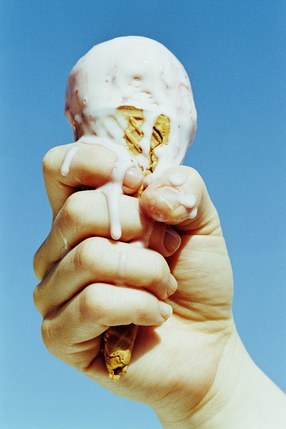For Teen Vogue, by Brittney McNamara.
Temperatures in some states are going to hit 120 degrees.
This summer, some parts of the country could get so hot that not even a pool party will cool you down. In fact, the weekend will bring dangerous temperatures to the western part of the country, spiking thermometers to record highs in places like Arizona and Southern California, ABC News reports.
Meteorologists are predicting temperatures as high as 118 degrees in Phoenix, Arizona, creeping up to 119 degrees on Monday. In Death Valley, California, temperatures are expected to hit 120 next week, while Las Vegas is preparing for 112-degree heat.
The National Weather Service warned that the heat is "rare, dangerous and deadly," ABC News reports, even in the part of the country that's used to extreme heat.
When it's hovering around 120 degrees outside, those high temps prompt your body to produce more sweat, National Geographic explains -- and it's that sweat that is the only reason you can survive. However, you also need to drink water and stay hydrated in order for your body to produce this sweat. When you're dehydrated, then your body doesn't sweat as much and your body temperature starts to go up -- which is dangerous, considering once your body temperature reaches 107 degrees, you're facing irreversible organ damage, and death.
Heat exhaustion and heat stroke are very real risks when it gets very hot outside. According to the Mayo Clinic, heat stroke happens when your body temperature reaches 104 degrees. Symptoms include confusion, agitation, nausea and vomiting, red skin, increased heart race and headache. You should call 9-1-1 if you think you are experiencing heat stroke.
Heat exhaustion is a little less serious, but still dangerous. Symptoms include cool and moist skin with goose bumps in the heat, heavy sweating, faintness, dizziness, fatigue, nausea, headache and more according to the Mayo Clinic. If you think you're experiencing heat exhaustion, stop and rest in a cool place immediately and drink cool water or sports drinks. If you're not careful, the Mayo Clinic warns heat exhaustion can progress to heat stroke.
While a few hot days might not seem like a big deal, it can have serious consequences if you're not careful. ABC News points out that around 3,000 Americans died between 2006 and 2010 from heat-related illness. As always, check on your elderly neighbors and grandparents - it's not only a good deed, but a good way to stay in the AC.
More from Teen Vogue:
More Than Half of What You Eat Isn't Even Real Food, Study Finds

